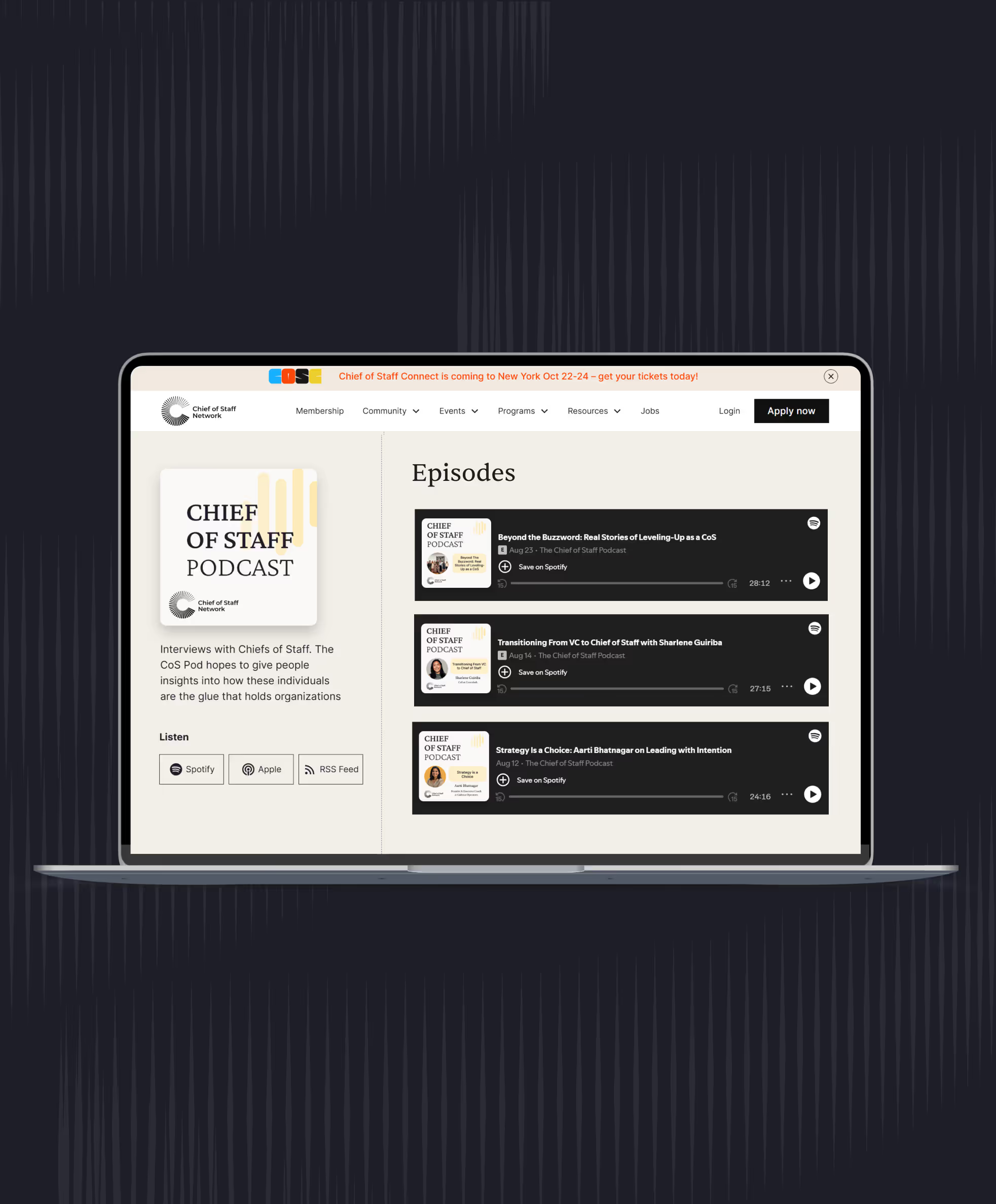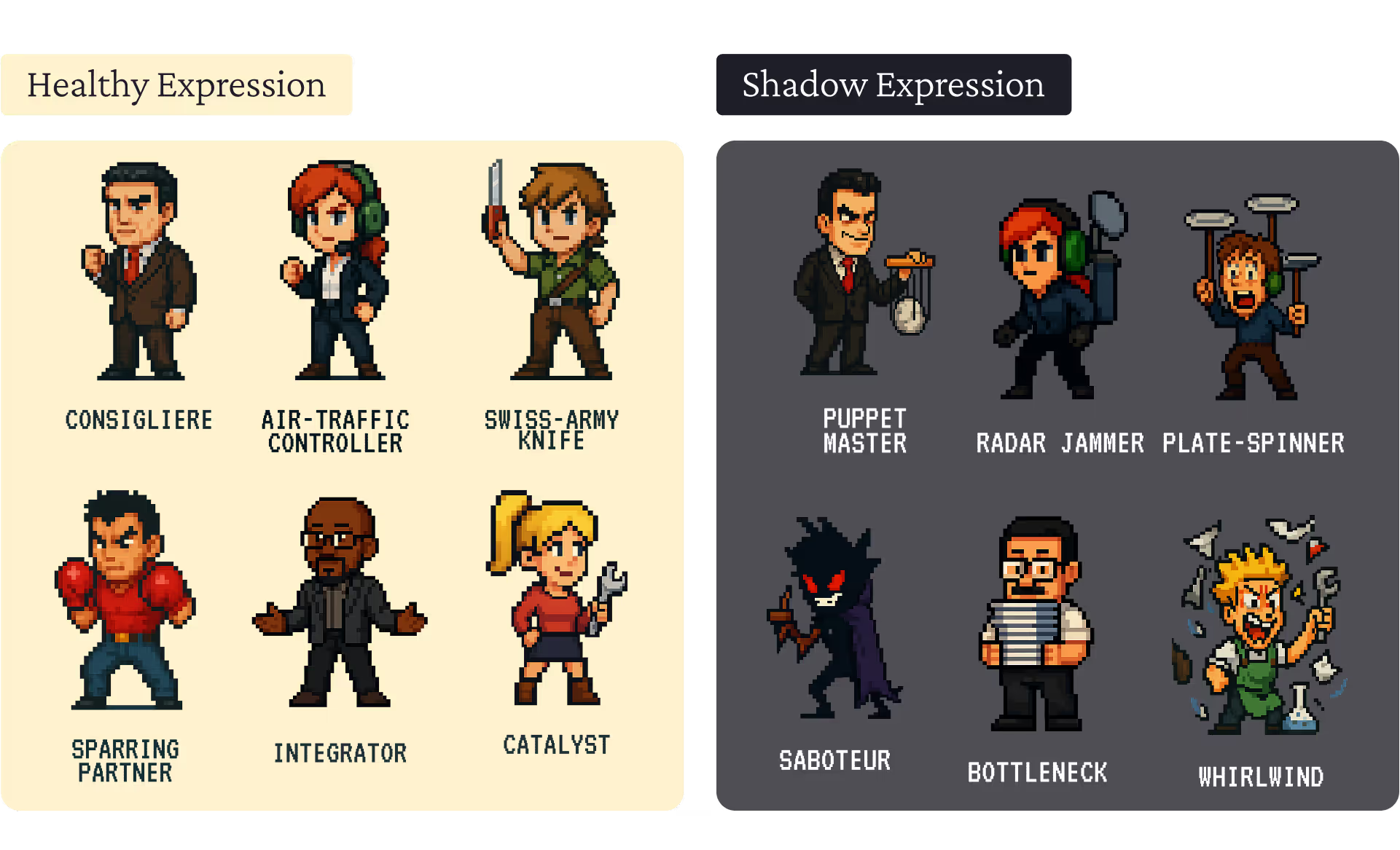This article was originally published the the Chief of Staff Network publication on Medium.
It seems like every founder these days has a Chief of Staff, but do you need one? Is this the right time to hire one? And how do you find a good one, anyway? These aren’t easy questions.
A Chief of Staff could be your best hire ever, giving you huge leverage on your time and the extra set of hands that you’ve been wishing for as a founder/CEO. Or, they could be a massive waste of time, creating more work for you and burning cash that you could use on other important hires.
Before we get into the nitty gritty, there’s one important thing to understand: a Chief of Staff is different from an Executive Assistant. EAs can be incredibly helpful. An EA is charged with making you more productive, typically through administrative tasks like managing your calendar, answering emails, and booking travel.
A Chief of Staff, on the other hand, typically focuses on making the entire company more productive and taking on higher-level responsibilities that leave more time for the CEO to do what he/she is best at. This has two important advantages: 1.) A focused CEO often translates to a faster and more focused team 2.) A CoS can amplify your efforts to create change across the team as the eyes, ears, and voice of the CEO.
Before you start to craft a job description, it’s important to know whether it’s the right time for you to bring on a CoS. Try answering the following questions — if you balk at some of them or find them hard to answer, you may not be quite ready yet:
- Are you ready to bring someone into your inner circle and let them see what you see?
- Are you looking for someone that will amplify your strengths, compensate for your weaknesses, or both?
- How do you work best and can you articulate that to someone else?
- Are you willing to invest the time necessary to make this person successful or do you expect to throw them in the deep end and watch them sink or swim?
- If you’re ready, let’s get into hiring a CoS.
Backgrounds
Caveat: Often the best CoS hire is the one made internally. Value-driven employees with strong internal relationships, institutional knowledge and high ambition are your best first candidates. They may come from existing cross functional roles (e.g. Biz Ops / People Ops) or join from more administrative positions (e.g Executive Assistant). Give these employees the benefit of interviewing for the role while running an external search in parallel.
The best CoS are able to deal with large amounts of ambiguity across differing teams / projects at once. They are typically excellent communicators, well-organized, and able to apply strategic thinking across all parts of your business. You’re likely looking for someone that can be ~80% effective in any challenge you throw at them. This role is often framed as an 18–24 month tour of duty before the CoS may move on to other leadership or founder-type positions. Finding a career-CoS, or even a repeat CoS is rare. Occasionally we see CoS working at early stage companies take their experience and make the leap to larger growth stage businesses in a new CoS role.
Candidates with backgrounds in management consulting, business operations at another startup, and occasionally investment banking are likely to have the right skill sets to succeed as a CoS. But don’t immediately dismiss candidates without those experiences — sometimes they can be the most entrepreneurial and motivated. For simplicity, we are focusing on Chiefs of Staff reporting to the CEO. CoS reporting to other members of the senior leadership team (e.g. marketing, product, legal, etc) typically have more direct experience in these functional areas.
Let’s take a look at how each track creates qualified CoS candidates -
Management Consulting
2–4 years of experience at the top consulting firms (Bain, McKinsey, BCG, etc) provides candidates with strong analytical skills, experience working in a fast-paced environment, as well as broad exposure to different business functions. These candidates can be the most versatile. They can be useful for very young startups where they can play a generalist role, sometimes incubating or leading departments before they truly exist. They can also be useful for more mature startups (Post Series B/C) where internal communications, executive team management, and board/investor relations become a bigger priority for the CEO.
One drawback of management consultant candidates is a potential lack of an ownership mentality. Their consulting projects all had end dates and they won’t necessarily have experience sticking around to see the results of their recommendations.
Startup Business Operations
Candidates with business operations experience at any high growth startup (post product-market fit) know first-hand what it takes to navigate quickly growing organizations. The biz ops candidate is comfortable dropping into ambiguous challenges, fostering relationships across teams, and owning projects with little ego. In particular, companies that have teams that handle all aspects of the business in one city or region (think Airbnb or Uber) produce great CoS candidates from biz ops positions. While they have the parent company to support them, often the challenges faced by local teams are unique to their market. This fosters an ownership mentality and a sense of urgency with limited resources. Candidates with experience in operations, sales operations, growth, and even product can have similar sets of skills.
Investment Banking
Investment bankers are often hard-working, intelligent, and have a clear view of the financial drivers of company performance. What’s more, many of them are used to working 80+ hour weeks, so having the sheer stamina that’s necessary to build any early stage startup won’t be an issue. However, be aware that the responsibilities of the CoS job go far beyond the typical routine of editing presentations and building models that a more junior investment banker will have seen. You’re looking for folks that are able to navigate complex operational challenges even without the comforts of established-company infrastructure to support them. Finance candidates working closely with portfolio companies for example (in a PE setting, for instance), tend to have more exposure to this.
Focus Points of the Job Description:
Lets dive into some of the core elements you’ll want to address in your job description to make sure you’re attracting the right candidates.
Personality Traits
Professional experience is only one part of the equation to finding a great CoS. At the CoS Tech Network, the quality we see mostly consistently among members of the community is a high degree of empathy. A CoS’ ability to connect with other members of their team and understand the motivations that drive them is critical to success. A good CoS will need to navigate complex relationships with every member of the team, especially those more senior than her.
Core Competencies
Organized — Is able to stay personally organized while managing the priorities of their executive. Thrives on accessing information holistically across the company.
Sense of Urgency — It’s a well known fact — companies slow down as they get bigger. A CoS should act as an additional entrepreneurial spirit promoting speed on the team.
Persuasive — Able to weigh in on or make decisions with authority across all parts of a business.
Coachable, no ego — The CoS impacts people/ teams differently. This person takes feedback well from any member of the team.
Collaborative, empathetic — A CoS assists in building the networked organization — they tear down walls so teams communicate better while maintaining a constant eye on how the teams feel.
Role Rotation / “Tour of Duty”
One of the first conversations every Chief of Staff should have with their CEO is about their “tour of duty”. This is a critical thing most CEO’s and hiring managers forget. While career trajectory can be immense, failing to put a plan for how your CoS will grow inside or outside the company sets them up for failure. In an 18–24 month tour of duty it also means the last 6–12 months will be much less productive as your CoS begins to question what her next track is. This doesn’t need to be hardcoded. It should be a fluid conversation that you’re both comfortable having from Day 1, which is why we suggest including a few lines about your vision for the role in the job description. It signals to candidates that you care about their career growth.
Leveling
One of the most misunderstood parts of this position is the approximate level that the CoS is working in and the areas of growth they can work towards to continue to level up.
The Chief of Staff Network has conducted research with dozens of current and former CoS to create a 5-Level Framework for Chiefs of Staff. The framework can be easily adopted to your own hiring plan with added competencies according to the assigned work, company values or expected outcome after the tour of duty.
Company stage/size is also a key reason the CoS role takes on vastly different forms. Our Chief of Staff leveling framework generally assumes that as org size increases, the complexity of the role also increases. So a level 2 Chief of Staff at an org size 3 (250–1000 employees) may be roughly equivalent to a level 3 Chief of Staff at org size 2 (50–250 employees).

Read the full blog post on the Leveling Framework and dimensions of growth.
The CoS Job Description, an example.
There is no right way to put together a JD for a CoS. Ultimately the person you hire will vary based on the skills and personality that complement you best. This can also vary widely between smaller startups and scaled businesses. One of the better job descriptions we’ve seen comes from Michael Karnjanaprakorn, who previously had multiple CoS at Skillshare and now at Otis. Snippets of that description are used in the below example.
Role —
Make it clear how this role will fit within the current organization and how you foresee it growing over time. Particularly for smaller startups, candidates want to know what they can expect from this position. Acknowledge the breadth of experience and impact this position provides to attract stronger candidates. This is also a good area to include the CoS Level and opportunities for growth.
Otis Wealth Example:
Your responsibility is simple: creatively solve any problem that gets thrown your way w/ relentless execution. In exchange, you’ll get front row seats taking a company from 0 to 1. And, more importantly, gain the skills, network and experience to accelerate your career.
You’ll work directly with the CEO and we’ll carve out a role that fits your strengths and passions. You’ll get to wear lots of hats: company strategy, fundraising, business operations, markeng, sales, hiring, product, etc ‐ whatever is the top priority. We’ll divide and conquer.
Your “tour of duty” will be for 24 months. Once your mission is done, we’ll talk through what you want to do next in your career. It can be moving to a new role within a company, or even starting your own. We’ll be supportive and help you land on your feet.
Responsibilities:
— Special Projects: An extra set of hands to help with strategic priorities on anything from Product to Growth
— Company Strategy: A strategic advisor and confidant (a highly trusted person with whom to discuss and pressure‐test ideas)
— Business Operations: An organizer to help manage a picture of the priories, projects, decisions, and actions that should be in the brain space of the CEO
Founder / CEO —
A brief description of the person your CoS is reporting to. A big part of this role is being able to learn directly from an established leader. Many job descriptions fail to mention who the CoS is reporting to and their background. Build your credibility here. Who else has worked for you and what have they gone on to accomplish?
Otis Wealth Example:
Michael Karnjanaprakorn (CEO) who was formerly the CEO/founder of Skillshare.
Some CoS alumni who worked with me include: Peter Boyce who is now a Principal at General Catalyst ($1B+ fund), Stephen Yang now Growth Product Lead at GoEuro ($146M raised) & TT Nguyen Duc who is a VC at Pearson Affordable Learning.
Who You Are —
Outline the type of personality traits you’re looking for. These should be specific and align with the CEO’s work style and company culture. Also note specific skill sets if required (e.g. strong financial modeling skills or experience working with investors).
Otis Wealth Example:
- Super Organizer — Because a CoS is often brought in to help bring order to things, the individual needs to be a methodical organizer.
- Strategic Thinker — The CoS needs to be able to see the big picture of things. A strategic mindset helps align detailed work to the big picture strategy, as well as evaluate what is urgent versus important.
- GSD Reputation — The Principal and the leadership team need to know that responsibilities or tasks that fall to the CoS are guaranteed to get done. The CoS should have a reputation for never dropping the ball.
- Trusted Operator — The CoS is often exposed to sensitive or confidential information in the normal course of executing the role. Consequently, the person in that role has to innately appreciate how to manage such information in confidence and with discretion.
- Expert Facilitator — Finally, a day-to-day part of being a CoS requires managing conversations, synthesizing multiple points of view, and aligning on direction…all in an impartial and professional way.
What You’ll Do —
It’s important to note the ambiguity of the role here. Your goal is to find someone comfortable with handling a multitude of responsibilities even if they have little hands-on experience with those tasks.
Otis Wealth Example:
- Growth Operations (70%) : identifying and acquiring high-quality supply, writing investment memos, and filling demand
- Finance & Legal (20%): run the SEC and FINRA regulatory processes, support the regulatory expansion into other asset classes and assist with other special projects as needed.
- Business Operations (10%): handing finance, accounting, and HR to ensure day- to-day operations are running smoothly
Compensation —
More info from our 2019 and 2020 Compensation Surveys on how much a CoS is typically making based on location, company size and experience.
How to Apply —
There are a few things we suggest you should ask for early on to help qualify candidates. A personal deck is a helpful exercise to better understand how a candidate presents their personality, strengths and weaknesses. Also a written memo or presentation that tackles a strategic decision in the business will help gauge a candidate’s critical thinking and quality of work.
Otis Wealth Example:
1) Personal Deck: include a) why you want to join; b) biggest accomplishments, c) strengths & weaknesses and d) anything else you want to include that showcases yourself (no more than 8 slides)
2) Written Memo ‐ pick an asset over $1M (not art) that we should invest in on the platform (no more than 2 pages)
Final notes on Onboarding
Building trust with a new person who is meant to double your capacity is not easy. As CEO, your first step is to dive right into the relationship, providing access to the information you use everyday (calendar, documents, and sometimes even email). Before you start dumping projects on her plate, let your CoS take a few days to go on a listening tour to start meeting other members of the team. There should be no agenda for these meetings. They should be casual coffee chats half-focused on getting to know each other and half-focused on learning who does what (and why) in the org. Building trusted relationships are critical to the overall success of your CoS and you, so give it real time.
To help ensure success of your new hire, you need to be the biggest advocate for your CoS. For many of your employees, this may be the first time they are working with a Chief of Staff. Naturally they may feel hesitant or cautious about having a new face in executive meetings (depending on Level), attending other team meetings, or stepping in to own or aid cross-functional projects. Remind your team why you hired this new operator and how they are there to support you and the rest of the team.
As you build trust with your CoS and come to greater understanding where they can add value to your priorities and those of the organization, you should also develop an advocacy plan. This can be as simple as light-touch messaging every time you inform key stakeholders that your CoS will be involved in X project or more public statements about the reasons for hiring a CoS, what they are there to accomplish, and how other team leads can expect to work with them.
Lastly, keep an ongoing dialogue about the structure of the position. Naturally as the business grows and changes your CEO responsibilities will shift as will those of your Chief of Staff. Accept that ambiguity and change are part of the position and you’re on a journey to do your best work together.
Bonus: Introduce your new hire to the Chief of Staff Network! They will get access to resources like CoS Development Tracks giving them the tools, frameworks and mentorship necessary to succeed in the role. They can also harness a world-class community of CoS from the fastest growing companies around the world to further accelerate their leadership development.
Thanks to Tom Guthrie for co-writing this article!
If you found this post helpful, give it a clap or share it with your network!
Hiring a Chief of Staff ? Add your listing to our Job Board! Let us know how we can help support your search.





.avif)
.avif)








